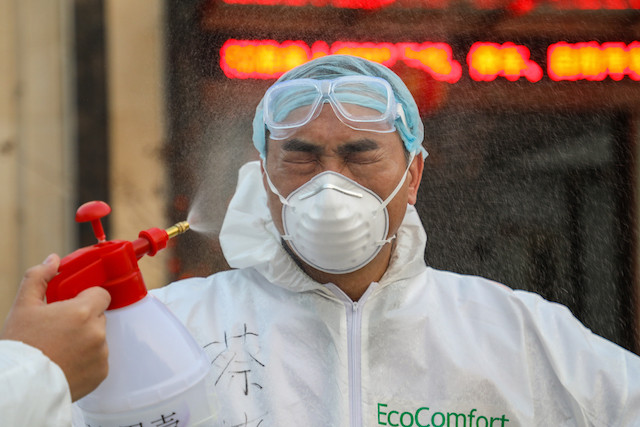Popular Reads
Top Results
Can't find what you're looking for?
View all search resultsPopular Reads
Top Results
Can't find what you're looking for?
View all search resultsResident physicians need safeguarding
Medical residents are pawns in hospital care. Ensuring their security and providing support to help them endure are ways to help them function in this perpetual battle.
Change text size
Gift Premium Articles
to Anyone
S
imilar to soldiers facing confinement or dishonorable discharge upon deserting, physicians are bound by the Hippocratic Oath as nurses are by the Nightingale Pledge not to leave the front line of the COVID-19 response.
The pandemic indeed is a war where health workers are the main soldiers. Physicians and nurses face serious risk of contagion and death, and the failure of hospitals and governments to provide adequate personal protective equipment has made the battle insufferable. In times like this, it is questionable whether desiring proper “compensation” in return is ethical, especially for resident doctors.
A residency program is a higher education degree for physicians to pursue and receive training in their selected field, whether internal medicine, pediatrics, anesthetics, pulmonology, surgery and many others. When they finish their study, they become medical specialists practicing in that specific expertise. During training, residents must complete academic requirements, namely writing case reports, conducting research, attending lectures and sitting regular exams. They are also mandated to provide clinical service to patients in designated teaching hospitals to earn their clinical competencies in wards, polyclinics, emergency rooms and operating theaters.
In short, residents are actual students who must pay tuition fees. However, under the banner of educational, academic hospitals may legally “employ” residents without salaries.
During the pandemic, resident physicians have become a vital force, since most teaching hospitals are the main COVID-19 referral hospitals in their respective regions. This eventually affects the fate of those residents. Many hospitals have attempted to adapt policies in response to the pandemic. Services to detect and treat this deadly infectious disease are prioritized. Residents’ role, whether their field of study is related to COVID-19 -- pulmonology, internal medicine, ear, nose and throat, pediatrics or anesthetics -- or not, are shifted to support the COVID-19 crisis center and wards. Many nonurgent treatments or elective surgeries have been postponed. Regular meetings and reports have been called off or moved online when possible, including lectures and paper presentations for residents.
The profound changes of routines and priorities have made teaching and learning activities less effective. All of these indirectly have put the residents’ studies on hold. This uncertainty of the pandemic threatens residents’ financial security, as they have zero income. Exhausting shifts and a moral obligation to distance themselves from their families and loved ones may also affect their mental wellbeing. With minimum thorough protection from the university and teaching hospitals, residents are still students with no capability to choose or refuse to participate in this “mandatory volunteering” in the pandemic. Questioning their right to safety and security has somehow been portrayed as unethical and a violation to their oath to make patients their first consideration.
University and teaching hospitals need to realize the vital contribution residents provide as they are the backbone of services despite the risks they face. Despite the long debate on whether they should get paid or not, Indonesian residents are generally resigned to their fate and understand the nature of Indonesia as a developing country that cannot afford to do the same as the United States or Australian government in funding salaries for residency education. However, at a time of crisis like this, additional earnings or hazard pay may be valuable for them simply to just get by.
As President Joko “Jokowi” Widodo announced that financial incentives are ready for frontline healthcare workers, does that apply to residents too? Beyond money, compensation could be in the form of relieving residents’ study burden by, for instance, a deduction of study period or an annulment of certain assignments. And if their education status is put on hold, that must be followed by a cancellation of tuition fees during the given period.
Medical residents are pawns in hospital care. Ensuring their security and providing support to help them endure are ways to help them function in this perpetual battle. Let us not delay the encouragement we can give to all healthcare workers who are risking their lives to achieve triumph in the fight against COVID-19.
***
Physician with Master of International Public Health degree from the University of Sydney, currently an internal medicine resident in Surabaya.











